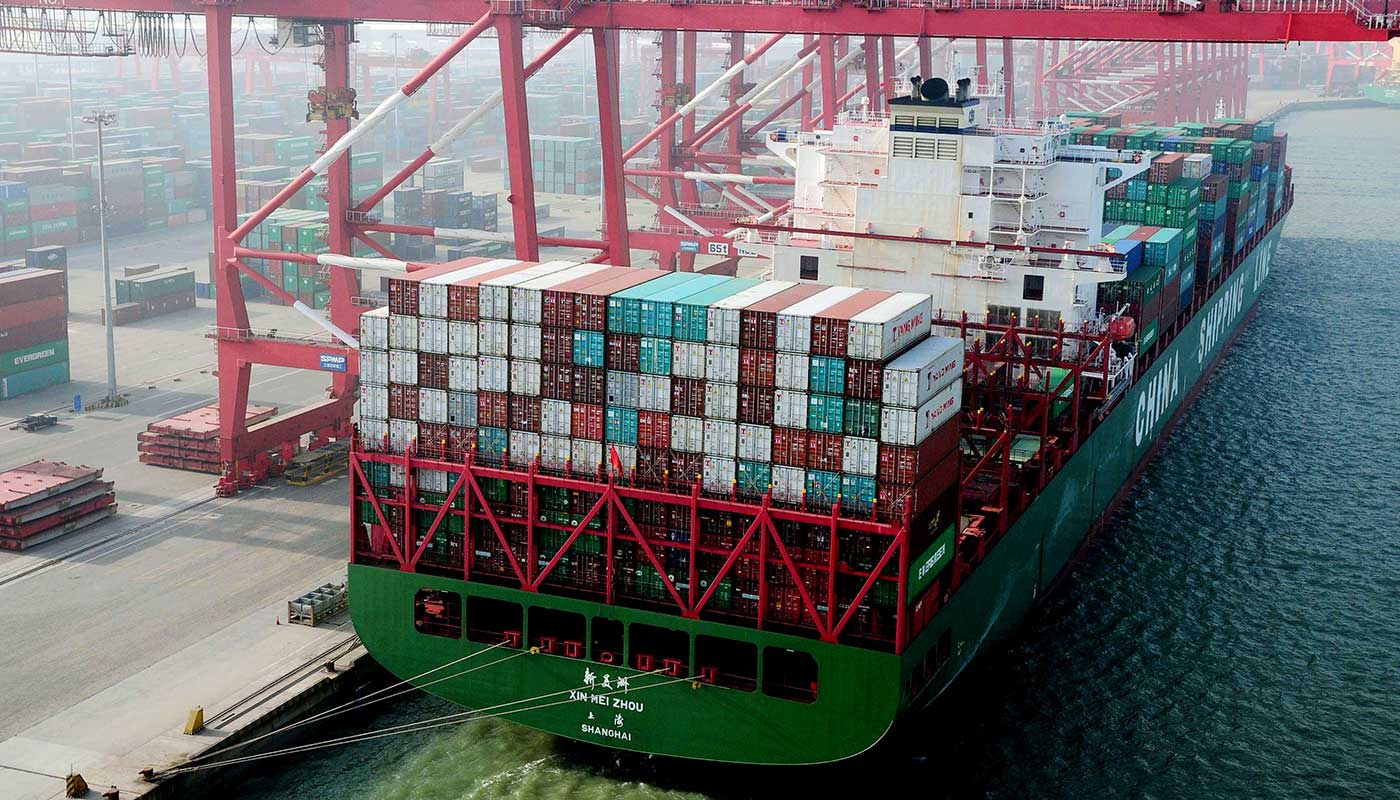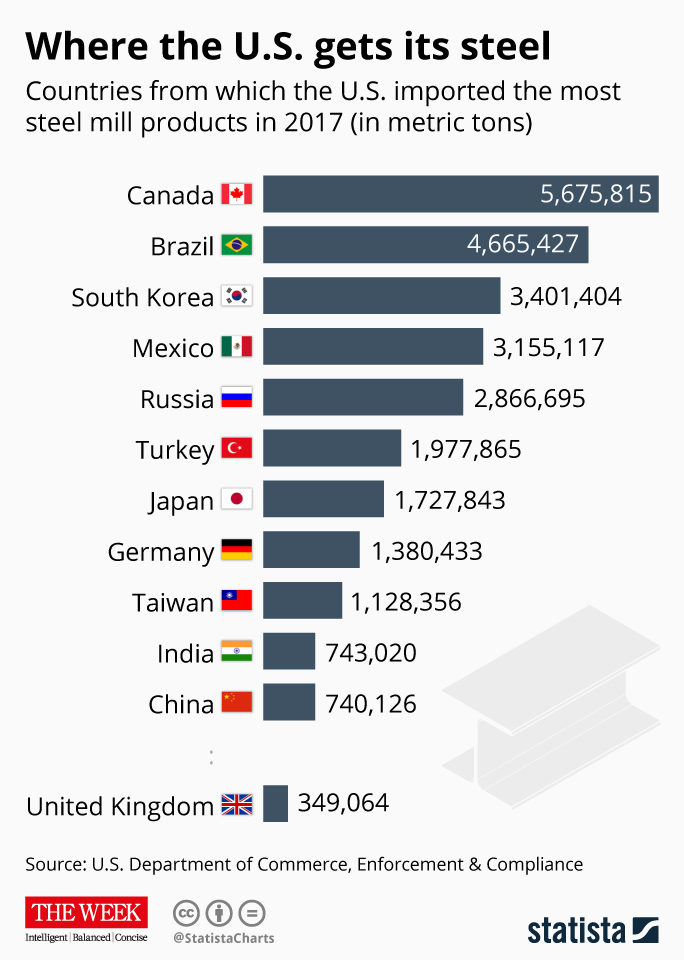US-China trade war: tariffs kick in
Chinese state media accuses Trump of acting like a ‘hoodlum’ as steep trade levies come into effect

A free daily email with the biggest news stories of the day – and the best features from TheWeek.com
You are now subscribed
Your newsletter sign-up was successful
US President Donald Trump’s controversial trade tariffs on Chinese goods have come into effect, signalling the start of a trade war between the two largest economies in the world.
The 25% levy, worth a total of $34bn (£25.7bn), kicked in at midnight Washington time. China has retaliated by imposing a similar 25% tariff on 545 US products, also worth a total of around $34bn.
China’s Ministry of Commerce said the US levies were “typical trade bullying”.
The Week
Escape your echo chamber. Get the facts behind the news, plus analysis from multiple perspectives.

Sign up for The Week's Free Newsletters
From our morning news briefing to a weekly Good News Newsletter, get the best of The Week delivered directly to your inbox.
From our morning news briefing to a weekly Good News Newsletter, get the best of The Week delivered directly to your inbox.
“It seriously jeopardises the global industrial chain, hinders the pace of global economic recovery, triggers global market turmoil and will affect more innocent multinational companies, general companies and consumers,” the ministry continued in a statement on its website.
China’s state-run newspapers have also been highly critical of Trump, with the English-language China Daily accusing the White House of behaving like a “gang of hoodlums”.
The Beijing-based Global Times adds: “If what the US wants is to escalate a trade war with China then so be it. A little fighting may be the only way the Trump administration clears its mind and allows everyone to sober up.”
The president has said the tariffs are aimed at stopping the "unfair transfers of American technology and intellectual property to China" and protecting jobs, reports the BBC.
A free daily email with the biggest news stories of the day – and the best features from TheWeek.com
What is a tariff?
A tariff is a tax imposed on imported goods when they enter a country, either as a fixed additional cost per unit or as a percentage of their value.
Before the widespread introduction of income tax, tariffs were one of the main instruments available to governments to raise revenue.
However, “the main purpose of a tariff these days tends to be about protecting particular domestic industries from foreign competition”, says Amitrajeet A. Batabyal, an economics professor at the New York State-based Rochester Institute of Technology, in an article on The Conversation.
Depending on the economic clout of the countries involved and the size of the affected industries, tariffs can upend national economies and even affect global trade.
What are the pros and cons of tariffs?
Tariffs are a key tool of the economic policy known as protectionism, which seeks to protect national industries from overseas competition.
In theory, artificially inflating the cost of imported goods encourages businesses to buy domestic, preventing national industries from being undercut by cheaper foreign labour.
Left-wing advocates see protectionism as a means of protecting workers from a “race to the bottom” in which employers slash wages and benefits in order to compete with emerging economies.
However, while American steel and aluminium workers may welcome the new measures, consumers are likely to be less enthusiastic, as import-reliant businesses affected by the tariffs are likely to pass on increased production costs to customers.

The higher costs of production could also spell trouble for workers in businesses reliant on imported steel or aluminium.
“Studies found that the most recent steel tariff imposed by President George W. Bush in 2002 resulted in as many as 200,000 jobs lost in industries that use steel to make their products,” says Business Insider.
In addition, in a globalised marketplace, a move towards protectionism in a major economy such as the US risks causing severe disruption to world trade, as trading partners impose their own retaliatory tariffs.
The Confederation of British Industry’s international director, Ben Digby, has warned that such a trade war “will damage prosperity on both sides of the Atlantic”.
-
 Why are election experts taking Trump’s midterm threats seriously?
Why are election experts taking Trump’s midterm threats seriously?IN THE SPOTLIGHT As the president muses about polling place deployments and a centralized electoral system aimed at one-party control, lawmakers are taking this administration at its word
-
 ‘Restaurateurs have become millionaires’
‘Restaurateurs have become millionaires’Instant Opinion Opinion, comment and editorials of the day
-
 Earth is rapidly approaching a ‘hothouse’ trajectory of warming
Earth is rapidly approaching a ‘hothouse’ trajectory of warmingThe explainer It may become impossible to fix
-
 Currencies: Why Trump wants a weak dollar
Currencies: Why Trump wants a weak dollarFeature The dollar has fallen 12% since Trump took office
-
 TikTok: New owners, same risks
TikTok: New owners, same risksFeature What are Larry Ellison’s plans for TikTok US?
-
 Trump wants a weaker dollar, but economists aren’t so sure
Trump wants a weaker dollar, but economists aren’t so sureTalking Points A weaker dollar can make imports more expensive but also boost gold
-
 Leadership: A conspicuous silence from CEOs
Leadership: A conspicuous silence from CEOsFeature CEOs were more vocal during Trump’s first term
-
 The end for central bank independence?
The end for central bank independence?The Explainer Trump’s war on the US Federal Reserve comes at a moment of global weakening in central bank authority
-
 Can Trump make single-family homes affordable by banning big investors?
Can Trump make single-family homes affordable by banning big investors?Talking Points Wall Street takes the blame
-
 What will the US economy look like in 2026?
What will the US economy look like in 2026?Today’s Big Question Wall Street is bullish, but uncertain
-
 Tariffs have American whiskey distillers on the rocks
Tariffs have American whiskey distillers on the rocksIn the Spotlight Jim Beam is the latest brand to feel the pain